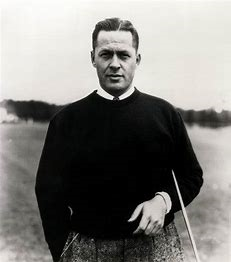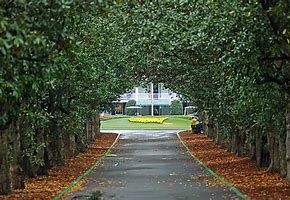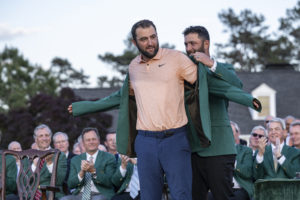 Looking to provide a service to golf by hosting an invitational golf tournament, Augusta National founders, thirteen-time major golf champion Bobby Jones, and businessman Clifford Roberts decided to hold an annual event inviting the world’s best golfers, beginning in 1934. The final decision was made at a meeting in New York at the office of member W. Alton Jones. Roberts proposed that the event be called the Masters Tournament, but Bobby Jones objected, thinking it too presumptuous. The name Augusta National Invitation Tournament was adopted, and the title was used for five years until 1939, when Jones relented, and the name was officially changed. An early decision was whether Jones would play or serve as an official. Jones preferred not to compete but was persuaded by the Club’s members to join the field. In the 12 Tournaments that Jones played, his best finish was 13th in 1934.
Looking to provide a service to golf by hosting an invitational golf tournament, Augusta National founders, thirteen-time major golf champion Bobby Jones, and businessman Clifford Roberts decided to hold an annual event inviting the world’s best golfers, beginning in 1934. The final decision was made at a meeting in New York at the office of member W. Alton Jones. Roberts proposed that the event be called the Masters Tournament, but Bobby Jones objected, thinking it too presumptuous. The name Augusta National Invitation Tournament was adopted, and the title was used for five years until 1939, when Jones relented, and the name was officially changed. An early decision was whether Jones would play or serve as an official. Jones preferred not to compete but was persuaded by the Club’s members to join the field. In the 12 Tournaments that Jones played, his best finish was 13th in 1934.
Many decisions made in the early days of the Tournament remain today. Among these are the four-day stroke play, which involves 18 holes each day instead of the then-customary 36 holes on the third day, eliminating qualifying rounds.
 The first Tournament was held March 22, 1934 and beginning in 1940; the Masters was scheduled each year during the first full week in April. Horton Smith won that first Tournament, and in the Fall of 1934, the nines were reversed. In 1935, Gene Sarazen hit “the shot heard ’round the world,” scoring a double eagle on the par-five 15th hole, tying Craig Wood and forcing a playoff. Sarazen won the 36-hole playoff the following day by five strokes. In 1942, Byron Nelson defeated Ben Hogan 69-70 in an 18-hole playoff, and the Tournament was not played during World War II in the following three years, 1943, 1944, and 1945. Augusta National assisted the war effort by allowing cattle, turkeys, and sheep to roam on the Augusta National grounds.
The first Tournament was held March 22, 1934 and beginning in 1940; the Masters was scheduled each year during the first full week in April. Horton Smith won that first Tournament, and in the Fall of 1934, the nines were reversed. In 1935, Gene Sarazen hit “the shot heard ’round the world,” scoring a double eagle on the par-five 15th hole, tying Craig Wood and forcing a playoff. Sarazen won the 36-hole playoff the following day by five strokes. In 1942, Byron Nelson defeated Ben Hogan 69-70 in an 18-hole playoff, and the Tournament was not played during World War II in the following three years, 1943, 1944, and 1945. Augusta National assisted the war effort by allowing cattle, turkeys, and sheep to roam on the Augusta National grounds.
The 1950s included two victories by Ben Hogan and the first of four for Arnold Palmer. Palmer’s 1958 win began the tradition of Amen Corner. In 1960, the Par 3 Contest was launched, and in 1965-1966, Jack Nicklaus became the first Masters champion to defend his title successfully. During the decade of the 1970s, the two founders of the Masters Tournament passed away. Both Jones and Roberts left indelible impressions on the Masters and the world of golf. Spaniard Seve Ballesteros won twice in the following decade, and Tom Watson captured his second title. In 1986, at age 46, Nicklaus donned his sixth Green Jacket. And in 1997, Tiger Woods broke the Tournament four-day scoring record for 32 years. A record Dustin Johnson broke in 2020.
At the 2001 Masters, Woods won his fourth consecutive professional major. In 2002, he became only the third player to win consecutive Masters titles. In 2005, Tiger became the third person to win at least four Masters Tournaments.
Dustin Johnson won the COVID-19-postponed 2020 Tournament in November of last year, breaking Tiger’s scoring record on the rain-softened Augusta National.
 Masters champion Scottie Scheffler of the United States is presented the Green Jacket by Masters champion Jon Rahm of Spain during the Green Jacket Ceremony after winning the 2024 Masters Tournament at Augusta National Golf Club, Sunday, April 14, 2024.
Masters champion Scottie Scheffler of the United States is presented the Green Jacket by Masters champion Jon Rahm of Spain during the Green Jacket Ceremony after winning the 2024 Masters Tournament at Augusta National Golf Club, Sunday, April 14, 2024.
Between 1980 and 2000, non-American golfers took eleven victories in those twenty years. This winning run was the longest streak for non-American golfers in any significant U.S. tournament since the early U.S. Open years. In 1986, Jack Nicklaus became the oldest player to win the Masters, winning for a sixth time at 46. In 1997, Tiger Woods won the Masters by twelve shots at age 21, breaking the long-standing scoring record and the record for the youngest player to win the Masters.
The Augusta National Golf Club course has been adjusted several times. In 1998, it measured 6925 yards from tee to pin on all holes. It was lengthened to 7270 yards in 2002 and 7445 yards in 2006. These adjustments have brought criticisms, but most competitive players have defended the course as freshly challenging.
Tickets for the Masters tournament are expensive and very difficult to secure. Even the practice rounds are difficult to get into, as applications for practice round tickets must be made almost a year in advance just to get your name in a national lottery that in 2017 included 1.2 million people hoping to “draw out” for tickets. Tickets to the tournament are only sold to members of a patrons list, which is closed. A waiting list for patrons has opened and closed periodically since 1972. As of 2008, The Masters has not accepted ticket applications for the four-day Tournament Proper.
This year’s tournament has received increased attention because four-time winner, Tiger Woods, will not attend as he is recovering from a horrific car accident that puts in jeopardy his continued involvement as a touring professional.
Jeff Waters is a PGA Master Professional and a member of the Golf Writers of America
For more on the Masters tournament and the Augusta National Golf Course, please read my blog post on: “How Green is the Masters?’ at: http://www.jeffgolfguy.com/how-green-is-the-masters/


